Without Men Blu-ray Movie
HomeWithout Men Blu-ray Movie 
Maya Home Entertainment | 2011 | 83 min | Rated R | Sep 27, 2011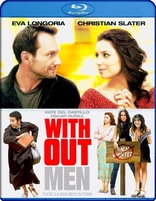
Movie rating
6.6 | / 10 |
Blu-ray rating
| Users | 0.0 | |
| Reviewer | 3.0 | |
| Overall | 3.0 |
Overview
Without Men (2011)
The women of a remote Latin American town are forced to pick up the pieces and remake their world when all the town's men are forcibly recruited by communist guerrillas.
Starring: Eva Longoria, Christian Slater, Oscar Nuñez, Kate del Castillo, Yvette Yates RedickDirector: Gabriela Tagliavini
| Comedy | 100% |
Specifications
Video
Video codec: MPEG-4 AVC
Video resolution: 1080p
Aspect ratio: 1.78:1
Original aspect ratio: 1.85:1
Audio
English: Dolby Digital 5.1 (448 kbps)
English: Dolby Digital 2.0
Subtitles
None
Discs
25GB Blu-ray Disc
Single disc (1 BD)
Playback
Region A (B, C untested)
Review
Rating summary
| Movie | 2.5 | |
| Video | 3.5 | |
| Audio | 3.0 | |
| Extras | 0.0 | |
| Overall | 3.0 |
Without Men Blu-ray Movie Review
Comedy Without Substance
Reviewed by Michael Reuben September 30, 2011Watching this latest Blu-ray release from Maya Entertainment, I found myself thinking of the critical gripe that no one knows how to make a good romantic comedy anymore. But is that the fault of the filmmakers or the audience? Art and popular entertainment respond to trends and instincts of their age, even if it's to react against them. The audience that reliably turned up to see Tracy and Hepburn spat and reconcile no longer exists. The politics of relations between the sexes -- and I'm using the term "politics" in the broadest possible sense, from the codes that govern intimate one-on-one relations to the most formalized and ritualized group interactions -- have become fragmented and multi-angled to the point where many people don't know which end is up. What's right? What's heartfelt? What's important? What's acceptable? What's offensive? And what's funny? Argentinian-born writer/director Gabriela Tagliavini seems to have been wrestling with such questions when she made Without Men. Instead of exploring relations between the sexes through a single couple or even multiple couples (as was tried with some success in the recent Crazy Stupid Love), Tagliavini took the approach of largely removing men from the picture and letting an entire village of women react to their absence. But to keep things light and entertaining, she applied tropes and styles borrowed from both sitcoms and teen sex comedies such as Porky's to source material that was, in its original form, entirely serious (James Cañón's novel, Tales from the Town of Widows). The result is completely (and deliberately) unrealistic, sometimes amusing and frequently baffling, but it's also unlike anything I've ever seen. It certainly kept my attention.
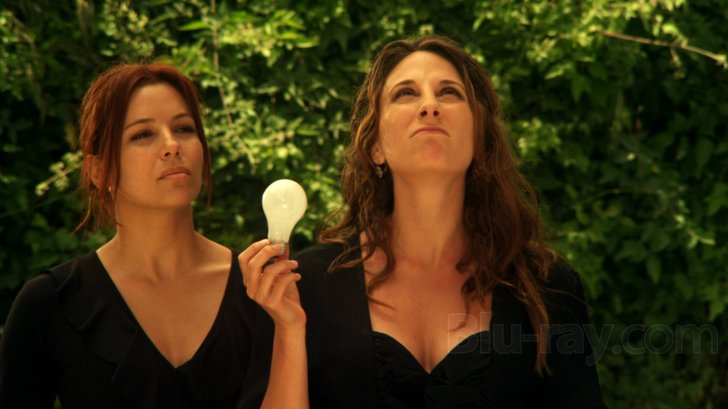
Without Men Blu-ray Movie, Video Quality 
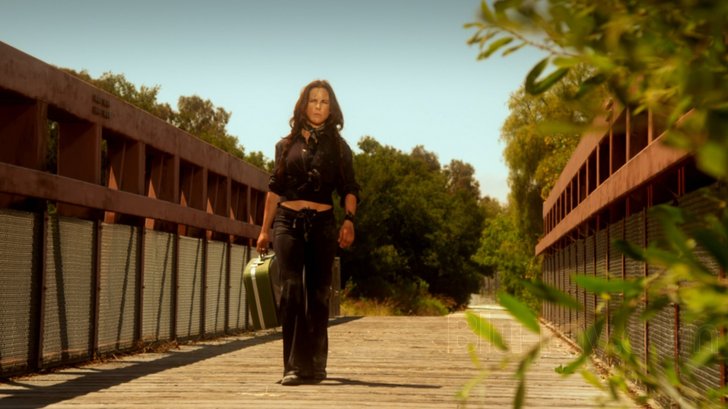
I haven't been able to find definitive information, but if I've interpreted the credits and image correctly, Without Men was shot on digital video (the credited cinematographer is Andrew Strahorn). The 1080p, AVC-encoded Blu-ray image indicates that the scenes in Mariquita, which constitute the bulk of the film, have been heavily manipulated to deepen and enrich the color palette for an artificially rich and luxurious warmth and depth. This contrasts starkly with scenes involving George, which are less saturated, and even more so with his boss stateside, which are positively chilly and desaturated by comparison. The visual message is so obvious that it hardly needs stating, and it's reinforced by the production and costume design. Mariquita looks less like a town and more like a collection of sets for a weekly TV series, and the supposedly poor women who live there seem to have a limitless supply of fine-looking outfits that fit them better than in a Victoria's Secret catalogue. Even the priestly garments that Father Rafael describes as being made of baggy polyester have a better drape than any polyester I've ever seen. Despite all the talk of cleaning, there is nary a speck of dust or dirt in evidence. As is often the case in comedy, this is a fantasy world in which no trial or tribulation is ever too real. The image is detailed but on the soft side, which is consistent with both the film's themes and the likely need to disguise limitations in the production budget. Certainly the softness appears to be intentional, rather than a flaw in the transfer, because there is never a sense that detail is being blurred or blown out by excessive contrast. Black levels are good, and no evidence appears of DNR or other inappropriate filtering. I did not see any compression or other artifacts.
Without Men Blu-ray Movie, Audio Quality 
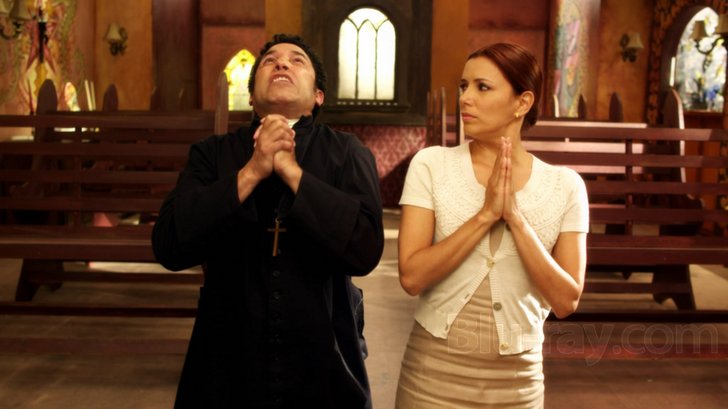
Maya has yet to embrace lossless audio. As is typical of its releases, the DD 5.1 soundtrack is identical to what one would expect on DVD. However, the track is effective at reproducing what is largely a front-oriented mix with limited use of the surrounds. In the film's opening, a fly can be heard buzzing to the right before it lands in the foreground, but after that I barely noticed the presence of the rear speakers. This is a functional mix that emphasizes dialogue, voiceover narration and the mood-setting score by Carlo Siliotto (who also scored Under the Same Moon). The track also contains an interesting selection of Latin-inflected songs, of which by far the most memorable plays over the closing titles. It's sung by Charo (remember her?) and is entitled, appropriately enough, "Cuchi Cuchi".
Without Men Blu-ray Movie, Special Features and Extras 
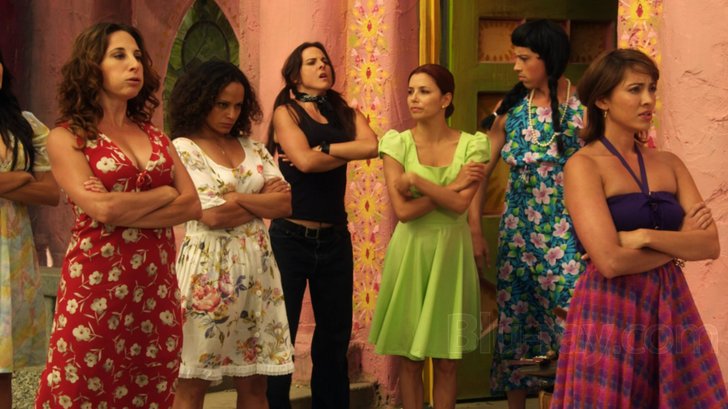
There are no extras. At startup, the disc plays trailers for Sympathy for Delicious, Forged, All She Can, Where the Road Meets the Sun, Didi Hollywood and Blue Eyes. All but the last can be skipped with the chapter forward button, and none are available once the disc loads.
Without Men Blu-ray Movie, Overall Score and Recommendation 
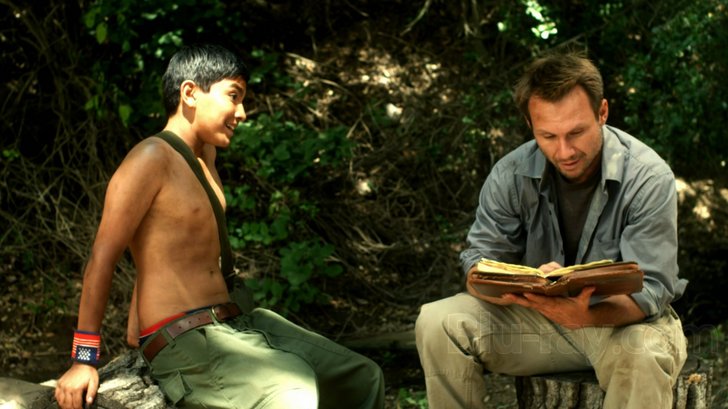
Like many authors who have sold their books to film companies, James Cañón took the healthy attitude that the film was an independent work. "If the novel is a tragedy with a touch of humor, the film is a comedy with a touch of tragedy", he was quoted as saying. A very light touch indeed. By the film's conclusion, it struck me that Tagliavini was so determined not to ruffle her audience out of the comfortable space of laughter that she'd stylized the film to the point of abstraction. Nothing about the town of Mariquita feels believable or human, and the same is true of George and his grotesque of a boss. Despite the best efforts of the actors, many of whom do fine work, their characters are doomed to inhabit extended comedy sketches, because they haven't been given a credible world in which to breathe. Many successful sitcoms have been founded on such characters, but that's because viewers come back weekly to watch familiar figures repeat the same ridiculous behavior. Without Men is supposed to be about people who grow and change, but that only happens in a world that feels real. Tagliavini is an interesting talent and someone to watch, but I can't recommend Without Men for more than a rental.
Similar titles
Similar titles you might also like

Albert Nobbs
2011

The Front Page
1931

Accidental Love
2015

Cavalcade
80th Anniversary / Fox Studio Classics
1933

Blue Jasmine
2013

To Rome with Love
2012

The Bonfire of the Vanities
1990

Impromptu
1991

To Be or Not to Be
1942

Hamlet
2009

Woman Times Seven
1967

The Other Woman
Love and Other Impossible Pursuits
2009

Personal Effects
2009

Fading Gigolo
2013

The Lost City
2005

The Thorn Birds
1983

Sophie's Choice
Collector's Edition
1982

Three Ages
1923

She's Funny That Way
2014

I, Daniel Blake
2016